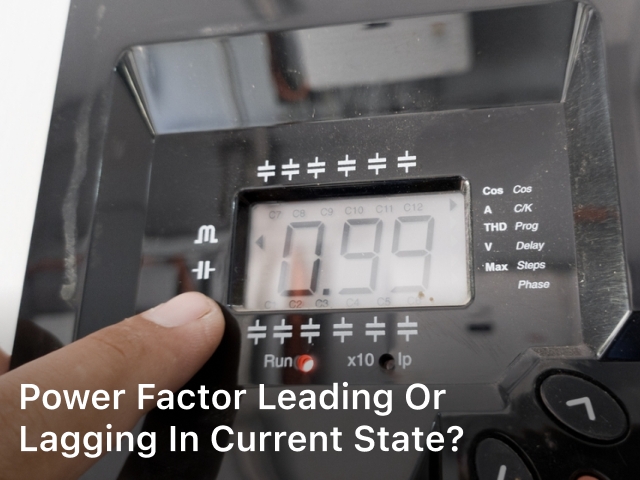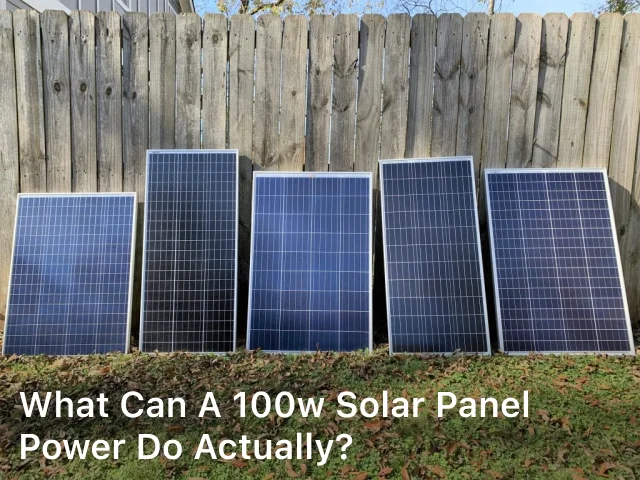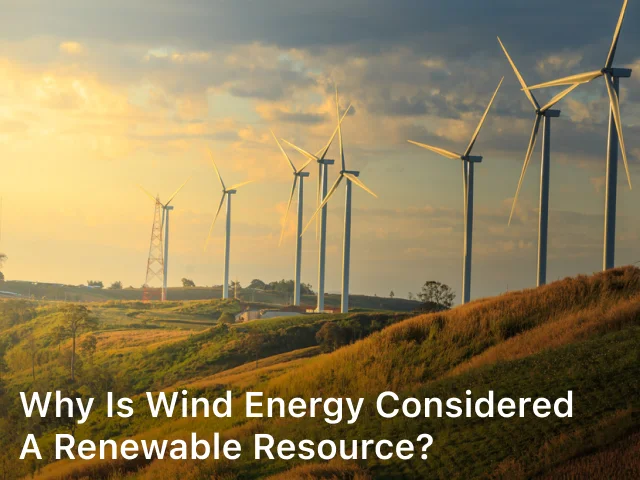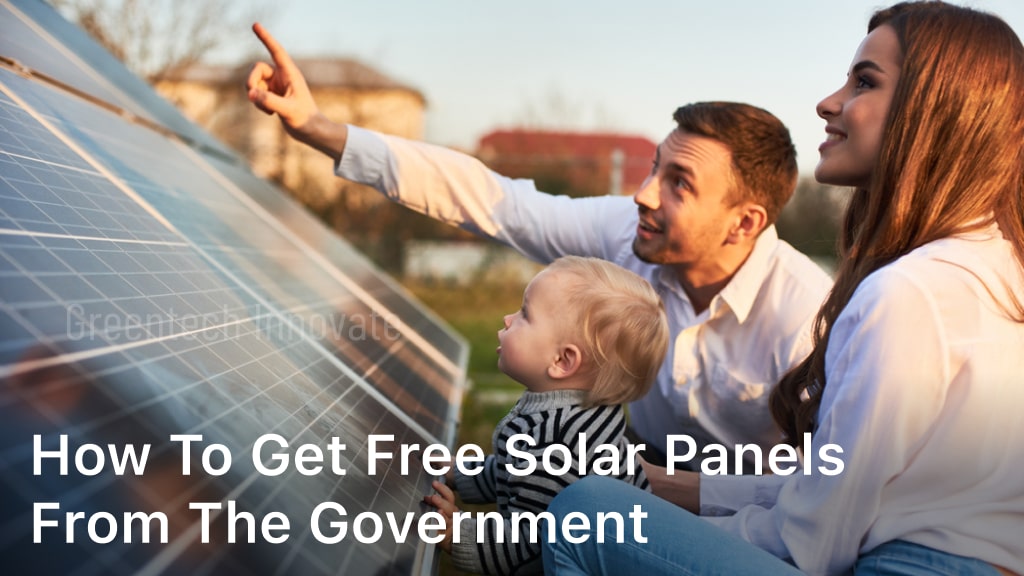
greentechinnovate.com. How to Get Free Solar Panels From The Government 2023 – Discover how to get free solar panels from the government. Maximize your savings with renewable energy while cutting down on utility costs in the U.S.
Are you interested in reducing your energy bills and your carbon footprint at the same time? Did you know that the US government offers free solar panels to qualified homeowners? With renewable energy sources gaining popularity in recent years, solar panel systems have become a popular choice for homeowners across the United States.
In this article, we will guide you on how to get free solar panels from the government. We will provide you with information on government solar panel programs, eligibility criteria, application processes, and more. By the end of this article, you should have a clear idea of how to apply for free solar panels and start saving on your energy bills.
Key Takeaways
- The US government offers free solar panels to qualified homeowners.
- Solar panels can help reduce energy bills and carbon footprint.
- This article will guide you on government solar panel programs and eligibility requirements.
- You will learn how to apply for free solar panels and maximize savings with solar energy.
- Choosing the right solar panel system and accessing support and resources will also be covered.
Understanding Government Solar Panel Programs
Installing solar panels in your home can be costly, which is why many homeowners turn to government programs for support. These programs offer free solar panels to eligible households, promoting the use of renewable energy and reducing utility costs.
In this section, we’ll dive into the various government-sponsored programs available for obtaining free solar panels, including eligibility criteria, application processes, and any restrictions or limitations that may apply.
Keep Reading : How Many Solar Panel to Charge a Tesla Battery?
Federal Government Solar Panel Programs
The main federal program for free solar panels is the Low-Income Home Energy Assistance Program (LIHEAP). Administered by the Department of Health and Human Services, LIHEAP provides financial assistance to low-income households, and in some states, that assistance can be used to install solar panels.
Another federal program that offers incentives for solar panel installation is the Residential Renewable Energy Tax Credit, which provides up to a 26% tax credit for the installed cost of solar panels.
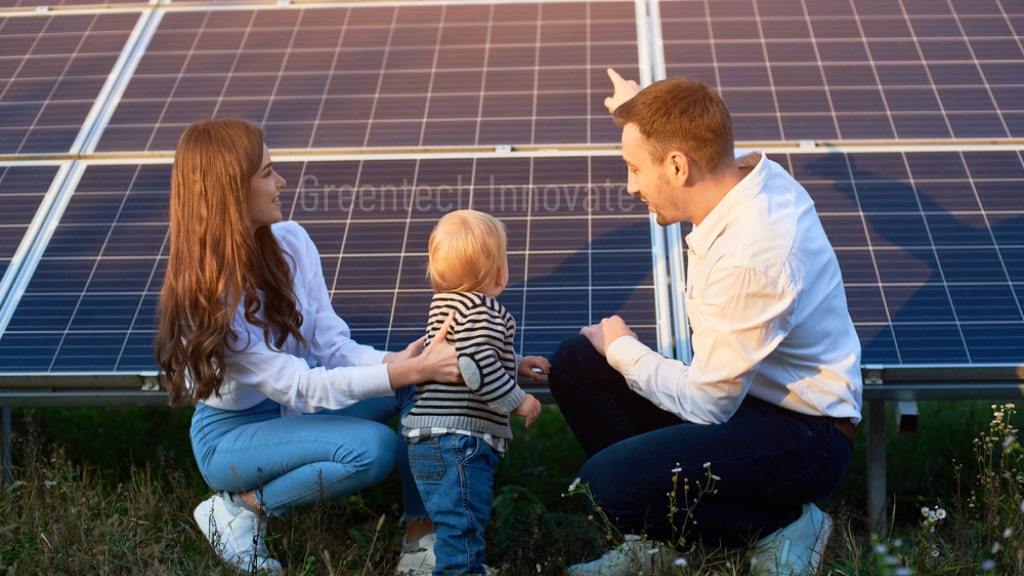
State Government Solar Panel Programs
State governments also offer various programs for free solar panels. One of the most popular is the California Solar Initiative, which offers rebates and incentives for the installation of solar panels in residential properties. Other states like New York, New Jersey, and Massachusetts also have similar programs that offer rebates, tax incentives, and grants to eligible households.
Municipal Government Solar Panel Programs
In addition to federal and state programs, some municipalities offer their own incentives and programs for free solar panels. For example, the city of Austin, Texas, offers a solar panel rebate program for homeowners who install solar panels in their homes.
These programs are usually designed to reduce the costs of renewable energy for residents and promote sustainability within communities.
Finding the Right Program for You
To qualify for any of these programs, you’ll need to meet specific eligibility criteria. Income, property ownership, and location are just some of the factors that may affect your eligibility for each program.
To find the right one for you, start by researching the programs available in your state and local area. Most programs have websites with details on the eligibility requirements and application processes. Take the time to review each program’s criteria to ensure you meet the requirements before applying.
Government-sponsored programs for free solar panels are an excellent resource for homeowners looking to reduce energy costs without breaking the bank. Each program has its own eligibility requirements and application process.
By understanding the different programs available to you, you can take advantage of renewable energy and reduce your carbon footprint while saving money on utility bills.
How to Get Free Solar Panels from the Government
1. Understanding the Initiative
Government-sponsored solar panel programs are aimed at promoting clean energy adoption. These initiatives vary from one region to another, but the underlying principle is the same: to make solar panels accessible to a wider audience. To get started, you need to understand the program available in your area.
2. Eligibility Criteria
To be eligible for free solar panels, you must meet certain criteria. These criteria often include income limits, property ownership, and residency status. It’s crucial to check your local government’s requirements and ensure you qualify for the program.
3. Finding Available Programs
Once you know you’re eligible, the next step is to find the government programs that offer free solar panels. A simple online search or a visit to your local government’s website can provide you with a list of available programs.
4. Applying for Assistance
After identifying the program that suits your needs, you’ll need to submit an application. This application typically involves providing information about your income, property, and other personal details. Make sure to complete the application accurately to enhance your chances of approval.
5. Site Assessment
Once your application is approved, the next step is a site assessment. Experts will visit your property to determine the best location for solar panel installation and assess its suitability.
6. Installation Process
Once the site assessment is complete, the installation of the solar panels can begin. Trained professionals will handle this step, ensuring that the panels are placed correctly and efficiently.
7. Enjoy the Benefits
With your solar panels in place, you can start harnessing the power of the sun. This will significantly reduce your electricity bills, and in some cases, you may even be able to sell excess energy back to the grid.
Keep Reading : How is Energy from The Sun Transferred to a Solar Cell
Researching Available Government Programs
Before applying for free solar panels from the government, it’s important to research and identify the programs that offer them. Here are some tips to help you get started:
- Check with your state or local government to see if they offer any solar panel programs. Many states provide incentives or rebates for installing solar panels, and some cities have their own programs as well.
- Visit the website of the Department of Energy’s (DOE) Office of Energy Efficiency and Renewable Energy. They offer a state-by-state guide to solar incentives and policies, as well as information on federal programs for renewable energy.
- Explore the Database of State Incentives for Renewables & Efficiency (DSIRE), a comprehensive resource that provides up-to-date information on incentives and policies for renewable energy in each state.
- Check with your utility company to see if they offer any programs for solar panel installation. Some utilities offer rebates or incentives for customers who install solar panels, or they may participate in community solar programs.
By taking the time to research available government programs, you can identify the ones that best suit your needs and increase your chances of qualifying for free solar panels.
Qualifying for Free Solar Panels
To qualify for free solar panels from the government, there are specific eligibility criteria that need to be met. Understanding these requirements can help you determine whether you qualify for the government solar panel program.
Income Requirements
Most government solar programs require that you meet certain income requirements to be eligible for free solar panels. The income limits vary depending on the state and program, but typically, households with low to moderate incomes are eligible for the program.
| State | Income Limit (for a household of 4) |
|---|---|
| California | $84,800 |
| New York | $87,720 |
| Florida | $75,384 |
These income limits are subject to change, and it is important to check with your state’s specific program for the latest information.
Property Ownership
To qualify for free solar panels from the government, you must own the property where the panels will be installed. If you rent your home, you are not eligible for the government solar panel program.
Location
Depending on where you live, you may be eligible for different government solar programs. Some programs are only available in certain states, while others are available throughout the country. It is important to check with your state’s specific program to see if you are eligible based on your location.
By understanding these eligibility requirements and determining whether you qualify for the government solar panel program, you can take the necessary steps to start the application process and get free solar panels from the government.
Keep Reading : What Can a 100w Solar Panel Power Do Actually?
Applying for Free Solar Panels
If you meet the eligibility requirements for free solar panels from the government, the next step is to apply for the program. Here’s how to get free solar panels from the government in 2023:
- Research available programs: Start by researching the various government programs available for free solar panels. Check out the Department of Energy’s website or your state’s energy office for information on federal or state programs.
- Gather necessary documents: Make sure you have all the necessary documents required for the application. This may include proof of income, property ownership, and identification.
- Fill out the application: Once you have identified the program and gathered the necessary documents, fill out the application form completely and accurately. Be sure to follow the instructions carefully.
- Submit the application: After completing the application, submit it to the appropriate government agency responsible for the program. Be patient and expect to wait for a response from the agency.
- Installation: If your application is approved, the government agency will arrange for the installation of the solar panels on your property. You will not be responsible for the installation costs.
It’s important to note that with the high demand for free solar panels, there may be a waiting list for some government programs. In addition, the availability of these programs can vary from state to state. Check with your state’s energy office for more information on local programs.
Pro Tip: If you need assistance with finding or applying for government programs, consider contacting a local non-profit organization or community group. Many of these organizations offer free assistance with navigating the application process.
By following these steps, you can take advantage of government programs to get solar panels from the government for free. This is an excellent way to reduce your carbon footprint, save on energy costs, and contribute to a sustainable future.
Maximizing Savings with Solar Energy
Installing solar panels can lead to significant savings on energy costs and provide an environmentally friendly way to power your home. If you’re looking to get free solar panels from the government, it’s important to understand how you can maximize those savings.
One of the main benefits of solar panels is that they can generate electricity for your home, reducing the amount of power you need to purchase from your utility company.
When your solar panels produce more energy than you need, the excess can be sold back to your utility company through a process called net metering.
Net metering allows you to earn credits on your energy bill for the excess energy your solar panels produce. These credits can offset the cost of the energy you use from the grid when your solar panels aren’t producing enough power, such as at night or during cloudy weather.
Keep Reading : What is the Ultimate Source of Energy for Plants?
Incentives and Tax Credits
In addition to net metering, there are other financial incentives available to homeowners who install solar panels. Some states offer rebates or other financial incentives to encourage the use of renewable energy.
Additionally, the federal government offers a tax credit for homeowners who install solar panels. This tax credit allows you to deduct a portion of the cost of your solar panel system from your federal income taxes.
The amount of the federal tax credit depends on the size of your solar panel system, but it can be a significant amount of money. For example, if you install a 5-kilowatt solar panel system, you could be eligible for a tax credit of up to $7,500.
Long-Term Savings
While there is an initial cost to installing solar panels, the long-term savings can be substantial. Solar panels have a lifespan of 25-30 years and require very little maintenance, which means you can save money on energy costs for decades to come.
In addition, solar panels can increase the value of your home. According to a study by the National Renewable Energy Laboratory, homes with solar panels sell for an average of 4% more than homes without solar panels.
Conclusion
Overall, getting free solar panels from the government can be a great way to save money on energy costs and reduce your environmental impact. By taking advantage of net metering, financial incentives, and long-term savings, you can maximize the benefits of your solar panel system and enjoy clean, renewable energy for years to come.
Choosing the Right Solar Panel System
When it comes to choosing the right solar panel system, there are several factors to consider to ensure that you get the most out of your investment. Aside from the fact that you are getting the panels for free, you still want to make sure that you get a high-quality system that will generate enough electricity and savings.
Panel Efficiency
The efficiency of solar panels refers to how much sunlight they can convert into electricity. High-efficiency panels produce more electricity, which is especially important if you have limited roof space.
The efficiency rating of the panel is usually indicated as a percentage, and higher is better. For example, a panel that has an efficiency rating of 20% will generate more electricity than a panel with a rating of 16%.
Size
The size of the solar panel system you need will depend on the size of your home and your energy needs. A larger system will generate more electricity and save you more money, but it will also cost more money to install. A smaller system may be more affordable, but it may not generate enough electricity to meet all of your energy needs.
If you are unsure of how big of a system you need, you can consult with a solar panel installation company. They can evaluate your energy usage and recommend a system that will meet your needs.
Example Table
| System Size | Number of Panels | Estimated Annual Savings |
|---|---|---|
| 3 kW | 10 | $600 |
| 5 kW | 16 | $1,000 |
| 7 kW | 24 | $1,500 |
Warranty
Solar panels typically come with a warranty that covers the panels for a certain number of years. A good warranty is important because it provides protection against manufacturing defects and other problems that can affect the performance of the panels. Make sure to choose a system with a warranty that covers both parts and labor, and that it’s long enough to provide peace of mind.
Installation Requirements
The installation requirements for solar panels can vary depending on the type of system you choose. Some systems require special mounts or brackets, while others can be installed directly onto the roof. Make sure to choose a system that can be installed safely and easily on your property.
By considering factors such as panel efficiency, size, warranty, and installation requirements, you can choose the right solar panel system for your needs. Keep in mind that not all solar panels are created equal, so it’s important to do your research and choose a high-quality system that will provide reliable performance and long-term savings.
Resources and Support for Solar Panel Installation
Installing solar panels can be a significant investment, but the good news is that there are many resources and support options available to help make the process more manageable.
If you qualify for free government solar panels, you can benefit from additional resources and support that can help you maximize your savings and reduce your environmental impact.
Government Programs for Solar Panels
The government offers a range of programs designed to help homeowners and businesses access solar panel technology. These programs can provide financial assistance, tax credits, and other incentives to make solar panel installation more affordable. Some of the most popular programs include:
| Program | Description |
|---|---|
| The Federal Solar Tax Credit | This program provides a tax credit of up to 26% of the total cost of installing solar panels on your home or business. |
| The Low-Income Home Energy Assistance Program (LIHEAP) | This program provides financial assistance to low-income households to help them pay their energy bills and make home improvements that can increase energy efficiency. |
| The Energy Efficiency and Conservation Block Grant (EECBG) Program | This program provides funding to states and local governments to support energy efficiency and conservation projects, including the installation of solar panels. |
Industry Organizations
There are many industry organizations that provide support and resources for homeowners and businesses interested in installing solar panels. These organizations can provide guidance on choosing the right solar panel system, finding a qualified installer, and maximizing your energy savings. Some of the most reputable organizations include:
- The Solar Energy Industries Association (SEIA)
- The National Renewable Energy Laboratory (NREL)
- The American Solar Energy Society (ASES)
Financing Options
If you don’t qualify for free government solar panels, there are many financing options available to help you cover the cost of installation. Some of the most popular financing options include:
- Home Equity Loans
- Solar Loans
- Solar Leases
- Power Purchase Agreements (PPAs)
Each financing option has its pros and cons, so it’s important to do your research and choose the option that best meets your needs and budget.
By taking advantage of these resources and support options, you can make the most of your solar panel installation and save money on your energy costs for years to come.
Conclusion
Obtaining free solar panels from the government is a significant step towards reducing your environmental impact and saving on utility costs. By taking advantage of government solar panel programs, you can benefit from renewable energy options without incurring any upfront costs.
To get started, research available programs and determine if you meet the eligibility criteria. Then, apply for free solar panels and choose the right system for your needs.
Maximizing savings with solar energy is possible through available incentives, tax credits, and long-term savings. By reducing your reliance on traditional energy sources, you’ll be able to reduce your carbon footprint and contribute to a cleaner environment. Additional resources and support are available for installing free solar panels, including government programs and financing options.
Start Your Solar Journey Today
Don’t wait to start your solar journey. Take advantage of government programs and free solar panel offers to make a positive impact on the environment while enjoying significant savings on energy costs. Start researching available programs and take the first step towards renewable energy today!
FAQ
How do I qualify for free solar panels from the government?
To qualify for free solar panels from the government, you typically need to meet certain eligibility criteria such as income restrictions, property ownership, and location requirements. Each government program may have specific guidelines, so it’s important to research and understand the qualifications for the program you are interested in.
How can I find information about government programs for free solar panels?
Researching available government programs can be done by visiting official government websites, contacting local energy offices, or seeking information from reputable sources. These resources can provide details about the programs in your area, eligibility requirements, and how to apply.
What documents and forms are required to apply for free solar panels?
The application process for free solar panels from the government usually requires certain documents and forms to be submitted. This may include proof of income, property ownership documents, identification, and completed application forms. It is important to carefully review the requirements of the specific government program you are applying to.
How long does it take to get approved for free solar panels?
The time it takes to get approved for free solar panels from the government can vary depending on the program and current demand. Some programs may have a waiting list, while others may have a more streamlined process. It is advisable to contact the specific program you are interested in to get an estimate of the approval timeline.
Can I still qualify for free solar panels if I rent my property?
Some government programs offer free solar panels to homeowners only, while others may have options for renters or those living in multifamily buildings. It is important to review the eligibility criteria of each program to determine if renting your property disqualifies you from obtaining free solar panels.
What happens if I move after getting free solar panels?
If you move after receiving free solar panels from the government, there may be requirements to notify the program and potentially transfer the solar panel system to the new property owner or revert the panels back to the government. It is essential to review the terms and conditions of the program to understand your obligations in such situations.
Are there any ongoing maintenance costs for free solar panels?
The maintenance costs for free solar panels can vary depending on the program and the system itself. In some cases, the government program may cover the maintenance costs for a specific period. However, it is important to inquire about any potential maintenance expenses or responsibilities associated with the solar panel system before applying.
Can I add additional solar panels to my system in the future?
Adding additional solar panels to your system in the future may be possible, but it will depend on the program’s terms and limitations. Some programs may allow for system expansion, while others may have restrictions in place. It is advisable to consult with the program administrators to understand the options available to you.
Will having free solar panels affect my property taxes?
The impact of having free solar panels on your property taxes can vary depending on local regulations and laws. In some areas, solar panels may increase the assessed value of your property, potentially leading to higher property taxes. It is recommended to consult with a tax professional or local authorities to understand the implications in your specific location.
